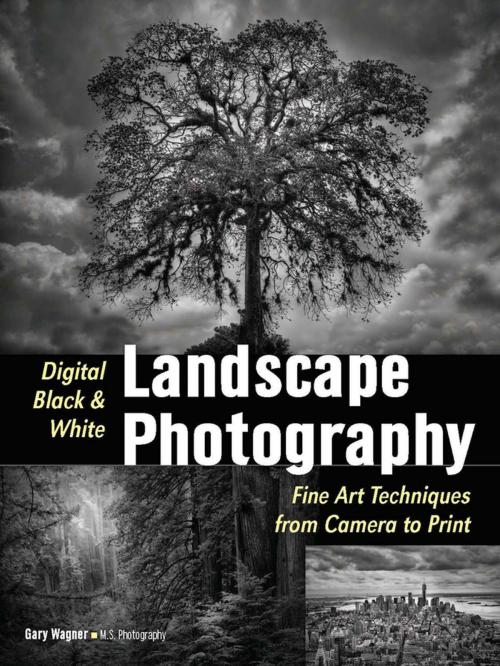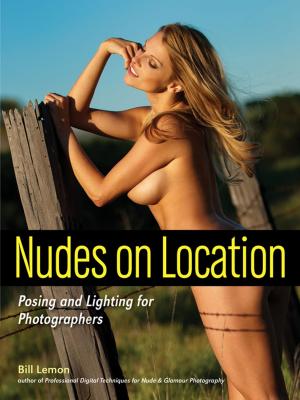Digital Black & White Landscape Photography
Fine Art Techniques from Camera to Print
Nonfiction, Art & Architecture, Photography, Equipment & Techniques, Techniques| Author: | Gary Wagner | ISBN: | 9781608959228 |
| Publisher: | Amherst Media | Publication: | July 20, 2015 |
| Imprint: | Amherst Media | Language: | English |
| Author: | Gary Wagner |
| ISBN: | 9781608959228 |
| Publisher: | Amherst Media |
| Publication: | July 20, 2015 |
| Imprint: | Amherst Media |
| Language: | English |
Landscape photography is a popular photographic genre-and for good reason. The great outdoors is an ever-ready subject. It is variable, as well; it is affected by changing light, decomposition, weather, human interaction, and myriad other factors. Its features range from natural to manmade elements-and many landscapes are comprised of both.
Photographers who point their camera’s lens at a scene do so in an effort to communicate their feelings about the landscape. Rather than simply document the scene, they seek to capture the spirit of place-perhaps to tell a story or depict a mood. They aim to share with viewers the ways in which the scene speaks to them. Accomplishing these goals may seem simple at the outset, but the task is rife with challenges.
In this book, Gary Wagner shows readers how to create powerful, evocative black & white landscape photographs filled with beautiful light, a full range of tones, and exquisite detail. Beginning with a look at the gear you’ll need to get the best-possible images, Wagner covers cameras, lens types, tripods, and filters. He then discusses the postproduction processes he uses to enhance his images, producing breathtaking photographic records of natural and man-altered locales.
Following a run-through of the basic tenets of landscape photography, Wagner presents 60 of his favorite images for review. Readers will find images in six categories: (1) Lakes and Streams, (2) Trees and Rocks, (3) Coastal Seascapes, (4) Winter, and (5) Man-Altered Landscapes. This presentation model allows readers to focus on the aspects of landscape photography that most appeal to them or challenge them most. With each image presented, readers will learn the strategies that went into conceptualizing and creating the shot-from exposure, to composition, to postproduction, and more.
With information on every aspect of creating striking, moving landscape images-from choosing gear, to studying light, to calculating ideal exposures, to composing images, to retouching/manipulating the images for breathtaking results, to setting up your workflow to ensure that the printed/output image meets the strictest criteria, this book will prove indispensable to photographers new to landscape photography or those seeking to take their image creation to a whole new level.
Photographers who point their camera’s lens at a scene do so in an effort to communicate their feelings about the landscape. Rather than simply document the scene, they seek to capture the spirit of place-perhaps to tell a story or depict a mood. They aim to share with viewers the ways in which the scene speaks to them. Accomplishing these goals may seem simple at the outset, but the task is rife with challenges.
In this book, Gary Wagner shows readers how to create powerful, evocative black & white landscape photographs filled with beautiful light, a full range of tones, and exquisite detail. Beginning with a look at the gear you’ll need to get the best-possible images, Wagner covers cameras, lens types, tripods, and filters. He then discusses the postproduction processes he uses to enhance his images, producing breathtaking photographic records of natural and man-altered locales.
Following a run-through of the basic tenets of landscape photography, Wagner presents 60 of his favorite images for review. Readers will find images in six categories: (1) Lakes and Streams, (2) Trees and Rocks, (3) Coastal Seascapes, (4) Winter, and (5) Man-Altered Landscapes. This presentation model allows readers to focus on the aspects of landscape photography that most appeal to them or challenge them most. With each image presented, readers will learn the strategies that went into conceptualizing and creating the shot-from exposure, to composition, to postproduction, and more.
With information on every aspect of creating striking, moving landscape images-from choosing gear, to studying light, to calculating ideal exposures, to composing images, to retouching/manipulating the images for breathtaking results, to setting up your workflow to ensure that the printed/output image meets the strictest criteria, this book will prove indispensable to photographers new to landscape photography or those seeking to take their image creation to a whole new level.
Landscape photography is a popular photographic genre-and for good reason. The great outdoors is an ever-ready subject. It is variable, as well; it is affected by changing light, decomposition, weather, human interaction, and myriad other factors. Its features range from natural to manmade elements-and many landscapes are comprised of both.
Photographers who point their camera’s lens at a scene do so in an effort to communicate their feelings about the landscape. Rather than simply document the scene, they seek to capture the spirit of place-perhaps to tell a story or depict a mood. They aim to share with viewers the ways in which the scene speaks to them. Accomplishing these goals may seem simple at the outset, but the task is rife with challenges.
In this book, Gary Wagner shows readers how to create powerful, evocative black & white landscape photographs filled with beautiful light, a full range of tones, and exquisite detail. Beginning with a look at the gear you’ll need to get the best-possible images, Wagner covers cameras, lens types, tripods, and filters. He then discusses the postproduction processes he uses to enhance his images, producing breathtaking photographic records of natural and man-altered locales.
Following a run-through of the basic tenets of landscape photography, Wagner presents 60 of his favorite images for review. Readers will find images in six categories: (1) Lakes and Streams, (2) Trees and Rocks, (3) Coastal Seascapes, (4) Winter, and (5) Man-Altered Landscapes. This presentation model allows readers to focus on the aspects of landscape photography that most appeal to them or challenge them most. With each image presented, readers will learn the strategies that went into conceptualizing and creating the shot-from exposure, to composition, to postproduction, and more.
With information on every aspect of creating striking, moving landscape images-from choosing gear, to studying light, to calculating ideal exposures, to composing images, to retouching/manipulating the images for breathtaking results, to setting up your workflow to ensure that the printed/output image meets the strictest criteria, this book will prove indispensable to photographers new to landscape photography or those seeking to take their image creation to a whole new level.
Photographers who point their camera’s lens at a scene do so in an effort to communicate their feelings about the landscape. Rather than simply document the scene, they seek to capture the spirit of place-perhaps to tell a story or depict a mood. They aim to share with viewers the ways in which the scene speaks to them. Accomplishing these goals may seem simple at the outset, but the task is rife with challenges.
In this book, Gary Wagner shows readers how to create powerful, evocative black & white landscape photographs filled with beautiful light, a full range of tones, and exquisite detail. Beginning with a look at the gear you’ll need to get the best-possible images, Wagner covers cameras, lens types, tripods, and filters. He then discusses the postproduction processes he uses to enhance his images, producing breathtaking photographic records of natural and man-altered locales.
Following a run-through of the basic tenets of landscape photography, Wagner presents 60 of his favorite images for review. Readers will find images in six categories: (1) Lakes and Streams, (2) Trees and Rocks, (3) Coastal Seascapes, (4) Winter, and (5) Man-Altered Landscapes. This presentation model allows readers to focus on the aspects of landscape photography that most appeal to them or challenge them most. With each image presented, readers will learn the strategies that went into conceptualizing and creating the shot-from exposure, to composition, to postproduction, and more.
With information on every aspect of creating striking, moving landscape images-from choosing gear, to studying light, to calculating ideal exposures, to composing images, to retouching/manipulating the images for breathtaking results, to setting up your workflow to ensure that the printed/output image meets the strictest criteria, this book will prove indispensable to photographers new to landscape photography or those seeking to take their image creation to a whole new level.















